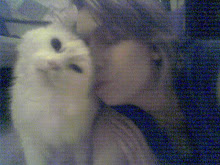The lawn is sprouting weeds, leading to a rant about Vygotsky
I have been relatively useless all day today. The only thing I accomplished was pulling up some of the weeds in the front lawn. Although it was nice to be outside, I know that everything I do is for the purpose of procrastinating from doing what I really need to do, which is read two chapters and comment on it for my online class. But, ugh! I can't seem to get into the reading. We started a new book on Vygotsky. Vygotsky is totally "in" right now in educational psychology, but I can't seen to wrap my brain around what I'm reading. I think the reason is that Vygotsky's ideas seem to run so contrary to my own that I'm either not interested in reading it or I'm annoyed by everything that is written, so I don't want to read it.
I think there is some accuracies to his ideas, so I want to get something out of the assignment. Vygotsky suggests that cognition originates in social interaction that is internalized. What first occurs interpersonally then occurs intrapersonally. Education is simply a means of enculturation through dialogue and artifact mediation (i.e., language or other tool use). I can agree with these ideas and I think dialogue is important for learning, but Vygotsky also suggests that cognition must be examined holisitically. It cannot be broken down into its component parts. In fact, cognition is emergent. Its emergent properties are fundamentally different from its constituent parts (i.e., cognition is more than the sum of its parts). If you break down cognition into its elements and study those independently, you can say nothing about the whole thing when you put it back together again.
I don't fully agree with this because I think that a stance like this inevitable leads to a return to strict behaviorism (in the guise of a sociocultural/historical paradigm) and shunning cognitive information processing. The only proper unit of analysis is behavior in a sociocultural context and there is no one-to-one relationship between behavior and cognition. I hail from the cognitive information processing approach, so these ideas about cogntition grate on my nerves. I think it is still possible and beneficial to examine the cognitive processes involved in any learning activity. In fact, I think we are doing a disservice to children to ignore this aspect of learning. I don't suggest that cognition is fixed, and therefore, we should differentiate between children based on cognitive tasks (especially ones with questionable validity). But, we should analyze the potential cognitive processes involved in a task and work on improving these processes if the child so needs it. Bringing Vygotsky back in, the way in which these higher cognitive processes are learned is through social interaction in the child's zone of potential learning.
There are many other aspects of Vygotsky's theory, but I won't go into it. The reader can do so if he or she wishes.




0 Comments:
Post a Comment
<< Home